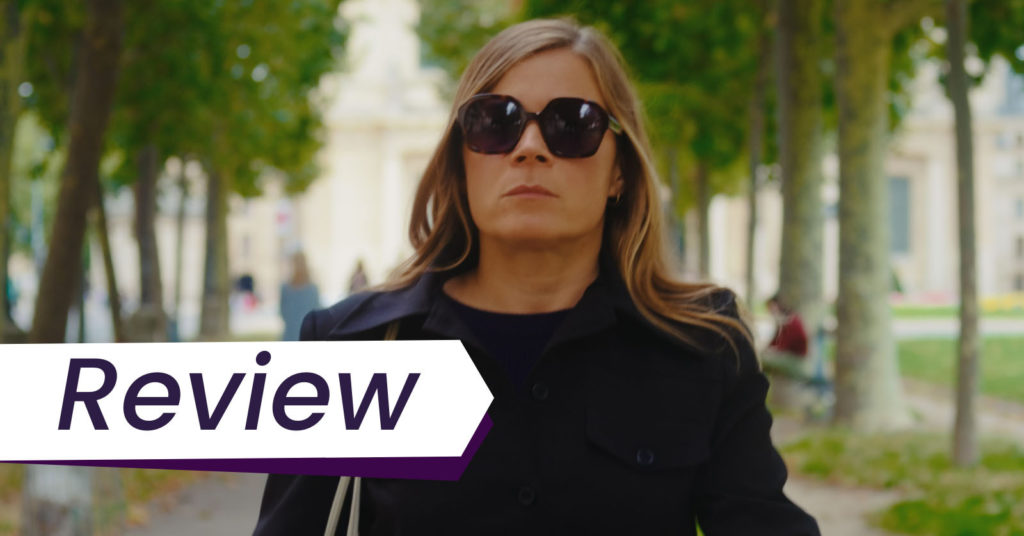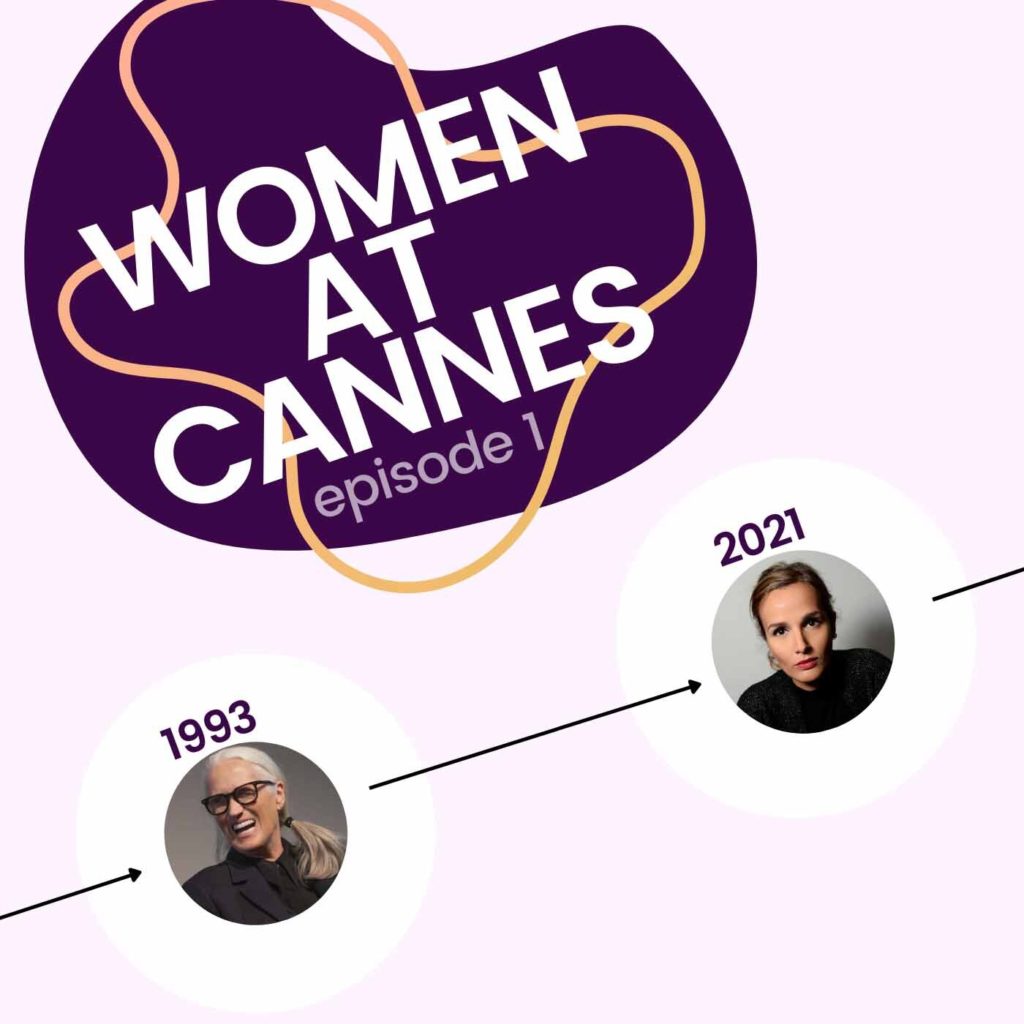Céline Devaux’s feature debut, Everybody Loves Jeanne, is wild, hilarious, sweet, and chaotic: a delightful anti-rom-com. It screened in the Cannes sidebar Semaine de la Critique.
Stay updated on films by women at Cannes 2022 and our current podcast season on Women at Cannes. Sign up for updates here.


Listen to the podcast season on Women at Cannes
Over the course of four episodes, we celebrate achievements of women directors at the Cannes Film Festival in Competition and beyond, both this year and in the past.
In the last few years, the Semaine de la Critique sidebar at Cannes — designed specifically for directors’ first or second features — has been a haven for forward-thinking comedies about modern thirtysomething women directed by (French) women. Last year, they programmed the hilarious and winning Anaïs in Love by first-time filmmaker Charline Bourgeois-Tacquet, about a woman searching for love and identity in the midst of her fear of mortality. In 2016, the sidebar programmed Justine Triet’s first collaboration with Virginie Efira about a woman on the verge, the whacky and wise In Bed with Victoria. This year, there’s the hugely delightful Everybody Loves Jeanne, which looks a bit more like a conventional rom-com but is more about the central protagonist’s inner turmoil over non-romantic things.
Writer-director Céline Devaux’s feature debut Everybody Loves Jeanne feels of a piece with recent anti-rom-coms made outside of France that refuse to let romance be the driving force of the narrative, even if it’s a part of it, like Ninjababy, Spinster, and Run Woman Run. Though not an artist like Rakel in Ninjababy, Jeanne also regularly dialogues with an animated figure in her head; for Rakel, it was her imagined animated unborn fetus, and for Jeanne, it’s more explicitly her inner monologue. And like Gaby in Spinster, Jeanne is happily childless, though she has a close relationship with her nephew. It’s an exciting new trend of films that are prioritizing women’s personal journeys in which romance is not unimportant but just one of many things they’re dealing with, both personally and professionally.
When we meet thirty-six-year-old Jeanne (Blanche Gardin), she’s dressed in black with sunglasses, walking through Paris, trying to be as inconspicuous as possible. We don’t know where she’s going, but she’s thinking back through the collapse of her career (and we soon learn, her finances). Remembered news reports reveal she was working on a major research project to clean plastic from the ocean — which received press attention for its humanitarian possibilities — and then the launch failed, complete with her diving into the water in a futile attempt to rescue it. Jeanne’s animated avatar and inner monologue interrupts these news reports to cheer Jeanne through her misery, and question her choice of outfit: “It’s a bit much, sunglasses and all. Dressed to impress? Your jacket hides a toothpaste stain.”
Jeanne is on her way to speak to a lawyer because she’s on the verge of bankruptcy. Having served as the sole guarantor for the investors in her project, she now finds herself not only without income but with a lot of debt. The lawyer is at first delighted to hear that Jeanne and her brother, Simon (Maxence Tual), inherited their mother’s Lisbon apartment — until she finds out it’s because their mother recently died by suicide. Neither Jeanne nor her brother have been back to Lisbon since, so the process of selling the apartment to save Jeanne’s finances also means digging up a complicated history with their mother and her death.
Unlike Summer Hours, this isn’t a film about tension between brother and sister; Simon is more keen to sell the apartment to solve Jeanne’s problems than she is. He’s extremely supportive, offering her the cash she needs to survive even though he’s merely, as he puts it “a humble physiotherapist.” He doesn’t say that to guilt her, but to put things in perspective. Jeanne’s interactions with Simon bookend the film, and he’s always there to lend a supporting hand. He also defies most archetypes of masculinity; he may tower over Jeanne, but he’s a loving single father, and when he eventually visits her in Lisbon to help her pack up the apartment, he lets her cover him with their mother’s makeup.
On her way to Lisbon, Jeanne meets Jean (Laurent Lafitte of the Comédie Française) at the airport, who remembers her from high school — they studied together in Lisbon — and how “everybody loved Jeanne” at school, though she has no memory of him. He’s a charmingly persistent and chaotic fellow, but manages never to cross the line of stalking (so notably different from his character in Elle). When they board together, he happily goes to his seat at the other end of the plane, but can’t resist wishing her a safe flight over the heads of many many people between them. It’s sweet if a little embarrassing for Jeanne, who can’t quite decide if she wants to be rid of him or is drawn to him.
In Lisbon, Jeanne is more preoccupied with reconnecting with her ex-boyfriend Vitor (Nuno Lopes) — now married to a younger woman and a new parent — than she is in seriously packing up her mother’s apartment, putting it on the market, or seeing Jean. But Jean delightfully imposes himself on her and brings the light — albeit with a kind of chaotic, “exactly how bad news are you” energy. When Jean doesn’t hear from Jeanne, Jean shows up at her apartment to see her, deciding to pretend to be her husband when they’re interrupted by a real estate agent.
On a shopping excursion with Jean, Jeanne watches him teach his young niece Theo how to shoplift (“You’ll find all the answers in this kleptomaniac…you worry me, Jeanne” intones her animated avatar, as she races from one side of the screen to the other on a scooter). When that fails, she looks on with equal parts horror and fascination as he quizzes his niece on his past teachings: the origin of the word “work” (related to a latin term for torture) and what to tell her mother to get out of going to business school (“Participating in the speculative depletion of the planet won’t make me happy. I want a job that allows me to be a free woman.”)

It would be easy to get sidetracked by the charming hijinks of Lafitte’s Jean, but Jeanne is in a personal and professional spiral. At home, she doom-scrolls through YouTube videos and articles about her “epic fail”. She sees the ghost of her mother (Marthe Keller) in the apartment, and struggles to square what she remembers as her mother’s disinterest in her with the fact that her mother has, for example, kept the news clippings stating the promise of Jeanne’s plastic project. She reasons to herself that her mother kept everything, so this means nothing. By the time Simon shows up, he admonishes her for only packing five boxes in ten days — but gently, kindly. There’s no animosity in this relationship. Along the way, there are subplots about the predatory real estate market, Jeanne’s disappointing ex-lover Vitor, and Jeanne’s inner monologue about how agreeing to go to the beach now means she has to find time to wax.
Director Céline Devaux has an uncommon sensitivity to finding the emotion in different spaces. She shoots the Lisbon apartment mostly in fragments, mimicking Jeanne’s own unwillingness to piece together her mother’s life and deal with her passing. The apartment is full of small details of a life lived, like sliding doors painted with original artwork by a friend and overflowing bookcases. But Jeanne is still detached from it: one of the first things she does is open her childhood bedroom which has been turned into an exercise room by her unsentimental mother. When the camera finally circles the apartment from the windows outside midway through the film, it’s the first glimpse we really get of the totality of the apartment — even though she’s given a tour to others twice. It’s also once Jeanne is starting to come to grips with her relationship with her mother.
At the same time, Devaux places Jeanne’s interactions with Jean in low stakes liminal spaces where there’s always an easy escape. The one time he comes to her apartment, she can’t get him out of there quickly enough. But when they meet on equal ground in public, it offers an opportunity to fall for him without feeling trapped. So they go grocery shopping, to the aquarium, and to the beach. By contrast, when she ultimately decides to have a fling with Vitor, it happens in the middle of nowhere at his beach house, and she has to ask him for money to get a cab so she can hightail it out of there right quick, yet she has to walk amidst a tree-lined highway to even find a cab.
In Everybody Loves Jeanne, Céline Devaux gives us the story of a woman in the midst of an existential crisis, but with a light enough touch and a whimsical fast pace that we can deal with the darkness — though the future of her career is still an open question. It helps that it’s an escape from her life in Paris to Lisbon. At the same time, she offers us three male characters who defy gender expectations — Jeanne’s nurturing brother, the WTF sweetness of Jean, and even the gentleness of the otherwise mid-life cliche that is Vitor. Jeanne’s animated avatar keeps us grounded in her headspace throughout, including pointing out her denial, so that these men never threaten to take over her story. It’s an upbeat, offbeat comedy about proper grown ups, silly in a way the French do best, and yet always grounded in reality. Breaking plates hasn’t been this cathartic since Emily Dickinson or Mustang.







